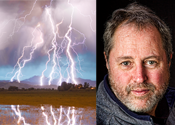We just got back from a few days off the grid, hanging out with moose in the indian peaks wilderness area. Here is a view and reflections from Brainard Lake of the Indian Peaks Wilderness area, in Boulder County Colorado with the Milky Way overhead in the Sky. This is my all time favorite place on the planet. A planned astrophotography shot for a long time. We were lucky to get clear skies.
The Indian Peaks Wilderness is a wilderness area located in north central Colorado, west of Boulder, managed jointly by the United States Forest Service and the National Park Service within the Arapaho and Roosevelt National Forests and small parts of the southern section of Rocky Mountain National Park. It borders the James Peak Wilderness to the south, and straddles the Continental Divide. The area receives very high visitation due to its proximity to the Boulder and Denver metropolitan area.
The area encompasses a stretch of the Front Range. It includes 7 peaks over 13,000 feet (4,000 m) in elevation. The highest point is North Arapaho Peak at 13,502 feet (4,115 m). The peaks are all within 100 feet (30 m) of elevation of each other. A portion of the area, encompassing the headwaters of North Boulder Creek, is closed to the public as it is the City of Boulder watershed.
Many of the peaks inside the wilderness area are named after western Native American tribes. The naming scheme was the idea of botany teacher Ellsworth Bethel. By 1914, few of the peaks between Longs Peak and the Arapaho Peaks had names. In the spring of that year Bethel, inspired by the established name of the Arapaho Peaks, settled on 11 tribal names for various summits along the Divide. The United States Board on Geographic Names kept 6 of his names: Apache Peak, Arikaree Peak, Kiowa Peak, Navajo Peak, Ogalalla Peak and Pawnee Peak. He later added Paiute Peak, as his use of the Ute band was denied due to too many other Colorado features sharing that name. Other names, including Shoshoni Peak, Hiamovi Mountain, Satanta Peak and Watanga Mountain were added later.
Colorado fine art nature landscape photography poster prints, decorative canvas prints, acrylic prints, metal prints, corporate artwork, greeting cards and stock images by James Bo Insogna (C) – All Rights Reserved.
ONLY TWO DAYS LEFT ! Check out this GREAT Fine Art Photography July Promotion, $100 in free wine when you buy any size print.
Art + Wine = The Perfect Companions
Please feel Free to share our links, with Family or Friends who may also enjoy them.
Striking Fine Art Photography Gallery
If you like my Art Gallery, please spread the word and press the Pinterest, FB, Google+, Twitter or SU Buttons!
Thank you!
Bo Insogna
Facebook: http://www.facebook.com/StrikingPhotographyByBo
Twitter: http://www.twitter.com/Lightning_Man
Google Plus: https://plus.google.com/u/0/+BoInsogna
Recent Striking Fine Art Photography Prints and Images:
One AMAZING Colorado Sunset – Time Lapse 7.24.2014
Full Moon Setting Over The Colorado Rocky Mountains
June Lightning Thunderstorms – Storm Catcher Bo Insogna Video
Storm Catcher – May 7th 2014 – First of the Season
Thunderstorms – Short Time Lapse and Mixed Images
Electrical Charged Green Thunderstorm with Lightning Strike
Filed under: Astrophotography, Boulder County Colorado Tagged: ‘brainard lake’, ‘indian peaks’, Arapaho Glacier, Arikaree Peak, astronomy, Astrophotography, Boulder County, Boulder County Colorado, Colorado, front range, Hiamovi Mountain, Indian Peaks Wilderness, Indian Peaks Wilderness area, James bo Insogna, Kiowa Peak, landscape, milky way, milkyway, mountains, National Park Service, Nature, Navajo Peak, North Arapaho Peak, north central Colorado, Ogalalla Peak, overhead, Pawnee Peak, peaks, reflections, Rocky Mountains, Satanta Peak, Shoshoni Peak, skies, sky, stars, The Indian Peaks Wilderness, United States Forest Service, View, Watanga Mountain
![]()





Leave a Reply